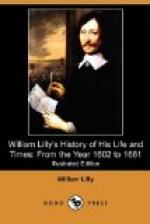and whereas formerly I could never endure to read
Valentine Naibod’s Commentary upon Alcabitius,
now having seriously studied him, I found him to be
the profoundest author I ever met with; him I traversed
over day and night, from whom I must acknowledge to
have advanced my judgment and knowledge unto that
height I soon after arrived at, or unto: a most
rational author, and the sharpest expositor of
Ptolemy
that hath yet appeared. To exercise my genius,
I began to collect notes, and thought of writing some
little thing upon the [symbol: aspect “conjunction”]
of [symbol: Saturn] and [symbol: Jupiter]
then approaching: I had not wrote above one sheet,
and that very meanly, but James Lord Galloway came
to see me; and, by chance, casting his eyes upon that
rude collection, he read it over, and so approved
of it, yea, so encouraged me to proceed farther, that
then, and after that time, I spent most of my time
in composing thereof, and bringing it, in the end,
into that method wherein it was printed 1644.
I do seriously now profess, I had not the assistance
of any person living, in the writing or composing
thereof. Mr. Fiske sent me a small manuscript,
which had been Sir Christopher Heydon’s, who
had wrote something of the conjunction of [symbol:
Saturn] and [symbol: Jupiter], 1603; out of which,
to bring my method in order, I transcribed, in the
beginning, five or six lines, and not any more, though
that graceless fellow Gadbury wrote the contrary:
but,
Semel et semper nebulo et mendax.
I did formerly write one treatise, in the year 1639,
upon the eclipse of the sun, in the eleventh degree
of Gemini, May 22, 1639; it consisted of six sheets
of paper. But that manuscript I gave unto my
most munificent patron and ever bountiful friend, William
Pennington, of Muncaster in Cumberland, Esq., a wise
and excellently learned person; who, from the year
1634, even till he died, continued unto me the most
grateful person I ever was acquainted with. I
became acquainted with him by means of Davy Ramsey.
Oh! most noble Esquire, let me now beg your pardon,
if I digress for some small time, in commemorating
his bounty unto me, and my requital of his friendship,
by performing many things successfully for his advantage.
In 1639 he was made captain, and served his Majesty
in his then wars against the Scots; during which time
a farmer’s daughter being delivered of a bastard,
and hearing, by report, that he was slain, fathered
the child upon him. Shortly after he returned,
most woefully vexed to be thus abused, when absent.
The woman was countenanced by some gentlemen of Cumberland,
in this her villany against him; so that, notwithstanding
he had warrants to attach her body, he could never
discover her: but yet, hunting her from one place
to another, her friends thought it most convenient
to send her to London, where she might be in most safety.
She came up to the city, and immediately I had notice
thereof, and the care of that matter was left unto




